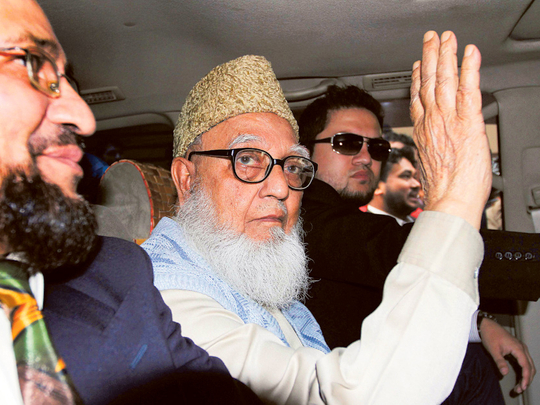
DHAKA: Bangladeshi war criminal Ghulam Azam died from a heart attack Thursday aged 91, just over a year after being sentenced to 90 years in prison for masterminding atrocities during the country’s independence war.
Azam was the head of Jamaat-e-Islami — the country’s largest party — when Bangladesh, then known as East Pakistan, fought a brutal nine-month war against Pakistan in 1971.
A special war court set up by the country’s secular government found Azam guilty in July 2013 of five charges of planning, conspiracy, incitement, complicity and murder during the conflict.
Azam “died of cardiac arrest at 10:10pm” at Bangabandhu Sheikh Mujib Medical University hospital in the capital Dhaka, the director of the clinic Abdul Majid Bhuiyan told reporters.
He became the second war crime convict to die in custody after Abdul Alim, a senior official of the main opposition party, died in August.
Azam’s son, Abdullahel Azmi, told AFP earlier on Thursday his father’s condition had deteriorated, prompting doctors to put him on life support.
“He was suffering from old age complications. He also did not get adequate care in the hospital,” his lawyer, Tajul Islam, said.
Islam said Azam would be buried in a family graveyard in Dhaka after a funeral, expected to be held on Friday.
Azam’s conviction last year sparked deadly protests by hardline Islamists and widespread celebration among secular groups.
There was no immediate comment from the government on Azam’s death and security was tight at the hospital as hundreds of Islamists gathered outside after the death was announced around midnight.
Secular protesters staged impromptu ‘victory’ marches at Dhaka University, hailing Azam’s passing.
During his trial, Azam was described as the ‘architect’ of pro-Pakistani militias responsible for atrocities during the war, in which three million people were killed.
When India intervened at the end of the brutal conflict, the militias killed dozens of professors, playwrights, filmmakers, doctors and journalists.
Many of the bodies were found a few days after the war at a marsh outside Dhaka, blindfolded and with their hands tied behind their backs.
Azam was described as the ‘mastermind’ behind the massacre of the intellectuals.
Prosecutors compared him to Nazi leader Adolf Hitler and sought the death penalty, but he was spared execution because of his age.
Under his leadership Jamaat-e-Islami opposed secession from what was then West Pakistan, which lay 2,000 kilometres away, with only Islam binding the two peoples together.
After independence, Bangladesh cancelled Azam’s citizenship and banned Jamaat and other faith-based parties when it adopted a secular constitution.
Azam returned to Bangladesh bearing a Pakistani passport in 1978, three years after the nation’s founding leader Shaikh Mujibur Rahman was assassinated. A junta was in power which permitted Islamist parties to operate openly.
His political rehabilitation was complete in 1993 when the Supreme Court returned his citizenship. After the judgement, he expressed some regret for past activities, but fell short of giving a full apology for his wartime role.
A wily political operator, Azam played the key role of kingmaker throughout the 1990s, in the process reviving the fortunes of the party, once banned and universally loathed for its horrific wartime role.












